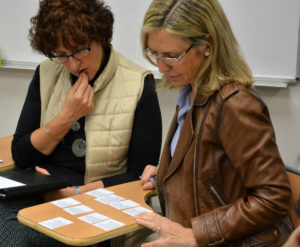2 weeks
Course Length
Mon to Fri
Lesson Days
15 a week
Lessons
English
Language
B2
Minimum Level
Overview
Technology for Language Teachers is aimed at teachers who want to use more technology in the classroom to expand the learning experience of learners. The tutor will lead practical workshops and debates based on an aspect of language teaching and learning with technology.
You will focus on a range of technologically-enhanced classroom activities considering the learning theories that underpin them. Furthermore, it will explore teaching issues relevant to the basic context while teaching in the classroom.
Completing this course will help you:
- To learn about technologically-enhanced classroom activities
- To get a deep knowledge of learning concepts that underpin technologically-enhanced classroom
- To explore a bank of resources to use in teaching.
Who is the course for?
This program is appropriate for language teachers who want to use more technology to boost the learning experience of their students.
Course Sample programme
Week 1 | Course Content |
Monday | Essential skills when implementing & using technology in the language classroom -How will technologies improve my students’ learning |
Tuesday | Getting students producing and consuming text in digital environments |
Wednesday | Integrating image with text. Multimodality and reading strategies for electronic texts |
Thursday | Improving listening and speaking skills using audio-based activities |
Friday | Creating meaningful and engaging multimedia experiences using video-based content |
Week 2 |
|
Monday | Exploring new written genres created by the internet and improving students’ e-writing abilities |
Tuesday | Online tools and technology-enhanced activities to aid vocabulary learning |
Wednesday | A technology-supported approach to grammar teaching |
Thursday | Computer-aided pronunciation and integrating technology into phonology work |
Friday | Supporting work with technology and a look at PBLT (project-based language teaching) and its many benefits. |
*Please note that the course content may be subject to change due to latest methodology trends updates.
1 lesson=45mins
Share This Class:
What people are saying



More Courses
You might also be interested in these courses

Teaching for Exam Classes
Teaching for Exam Classes is for English teachers who are preparing teenage or adult students for exams. Preparing to teach Cambridge or IELTS exam class. London…

Pronunciation and Performance with an expert “Adrian Underhill”
Pronunciation and Performance with an expert is a course led by a world-renowned ELT Consultant and Trainer. Adrian Underhill is an author and the series…

Practical Teacher
Practical Teacher is suitable for teachers who want a practical programme that covers developing resources, practical ideas and methods to liven up classrooms…

Life in Britain
Life in Britain is for teachers interested in finding out about modern British culture. The topics will be taught using a communicative methodology…

Language Development and Teaching Skills
Language Development and Teaching Skills Course is suitable for teachers who want to develop their own knowledge and use of English for the classroom…

Current Trends Teaching Methodology
Current trends will develop an awareness and understanding of current ELT principles and practice and your ability to critically examine current…
Methodologies

Total Physical Response
Total Physical Response is considered to be an excellent way of learning vocabulary. Moreover, since it is based on commands, the students can easily learn the meaning of the words in the target language.

The Structural Approach
This method is based on the opinion that it is imperative to understand the structures of the language. Understanding the complexities of the structures of the sentences in a language is more important than learning the vocabulary of the language.

The Direct Method
This method primarily focuses on the development of oral skills. One of the most important characteristic feature of this method is that visual materials and real-life objects are used. Moreover, such an oral training helps in reading and writing. There is no translation involved in this method.
